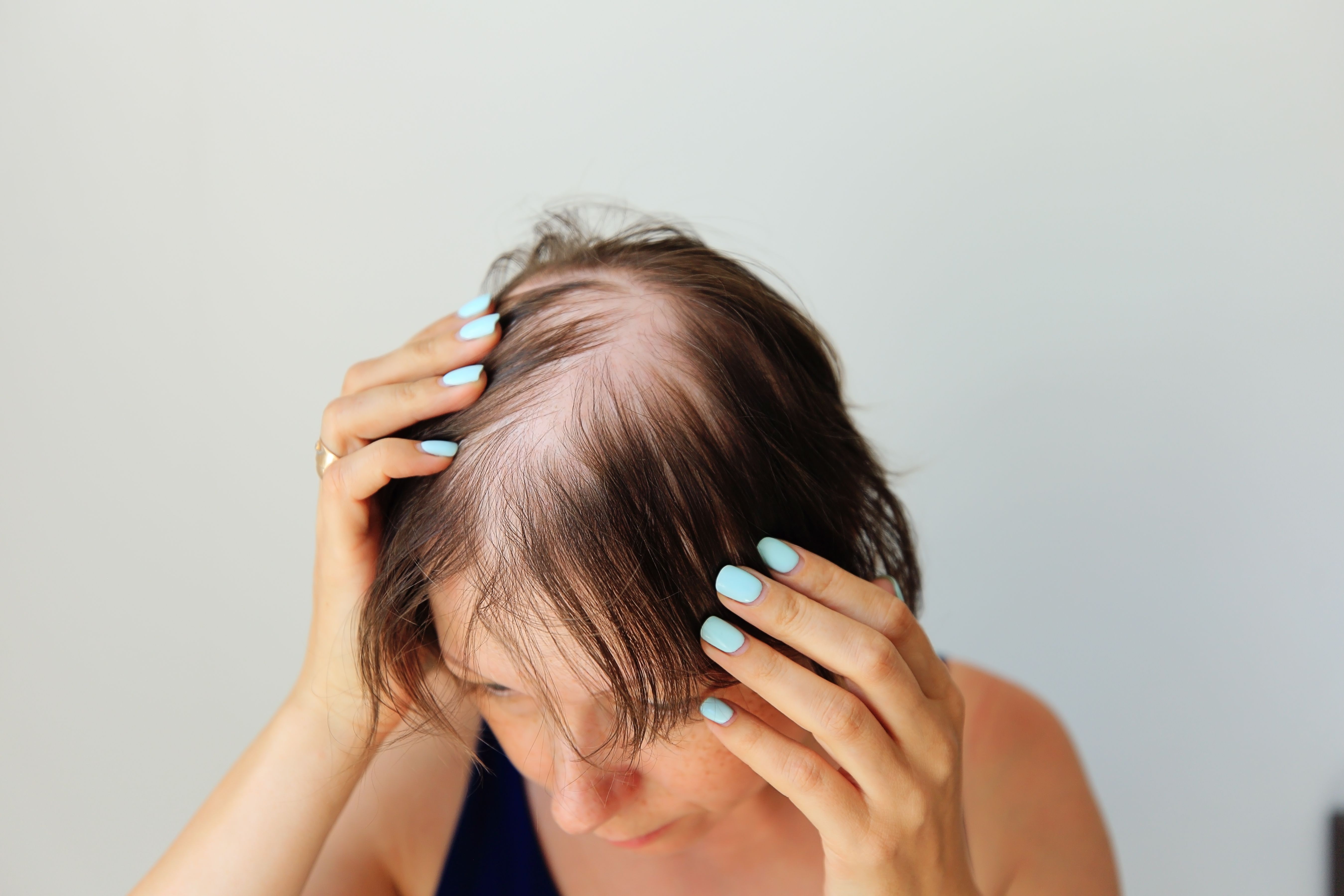- Case-Based Roundtable
- General Dermatology
- Eczema
- Chronic Hand Eczema
- Alopecia
- Aesthetics
- Vitiligo
- COVID-19
- Actinic Keratosis
- Precision Medicine and Biologics
- Rare Disease
- Wound Care
- Rosacea
- Psoriasis
- Psoriatic Arthritis
- Atopic Dermatitis
- Melasma
- NP and PA
- Skin Cancer
- Hidradenitis Suppurativa
- Drug Watch
- Pigmentary Disorders
- Acne
- Pediatric Dermatology
- Practice Management
- Prurigo Nodularis
- Buy-and-Bill
News
Article
Alopecia Areata After COVID-19 Vaccines: Clinical Insights
Author(s):
A recent review suggested there may be a higher risk of AA development after COVID-19 vaccination in patients with a history of AA or thyroid dysfunction.
Image Credit: © AliciaFdez - stock.adobe.com

Over 180 COVID-19 vaccine candidates using a variety of technological platforms, including viral vectors, live attenuated virus, inactivated virus, virus-like particles, nucleic acid (DNA and RNA), peptides, and recombinant protein approaches, have received approval for use or are in development.1 Although these vaccines are mostly safe, many articles regarding their side effects have been published, including those on nausea, fever, muscle and joint pain, redness or sweating, and, rarely, anaphylactic shock.2 Studies have also reported the development or recurrence of alopecia areata (AA) after COVID-19 vaccination, including a recent review with the goal to update literature on the subject following the completion of numerous other studies.3
Methods
The review included studies that provided data for case reports and case series of AA following COVID-19 vaccination with at least 1 dose. The following details were recorded from each article: sex, age, country/region origin, vaccine type, interval days between vaccination and symptom presentation, manifestations of AA, trichoscopy and histopathologic findings, treatment, and outcomes.
A total of 51 patients were included (31 women, 20 men) with an average age of 37.6 years (37.6 ± 16.5 years). The review reported that 27 of the 51 patients developed new-onset AA following COVID-19 vaccination, while the remaining 24 presented with relapsed or aggravated AA. Of the 51 included, 6 patients had a history of COVID-19 infections and 2 had a family history of AA.
Pfizer was the most common AA vaccine, with researchers stating that 45.1% of cases were caused by Pfizer, followed by ChAdOx1, nCoV-19 (27.5%), Moderna mRNA-1273 (19.6%), Sinopharm (3.9%) and SinoVac (3.9%). Among the 51 patients, researchers found that 34 patients (66.7%) experienced a patchy AA, while 8 patients (15.6%) progressed to alopecia totalis (AT), and 9 patients (17.7%) progressed to alopecia universalis (AU).
Treatments and Outcome
Among the 46 treated patients:
- Corticosteroid Treatment: 38 patients received either topical or systemic corticosteroids. Specifically, intralesional triamcinolone acetonide was administered to 16 patients, methylprednisolone pulse steroid therapy to 2 patients, pulses of dexamethasone to 2 patients, and oral prednisolone (ranging from 25 to 300 mg daily) to 5 patients. Other patients received various potent topical corticosteroids.
- Janus Kinase (JAK) Inhibitor Treatment: 11 patients were treated with a JAK inhibitor, specifically tofacitinib in 8 patients, and an unspecified JAK inhibitor in 3 patients. This treatment was used for severe AA or refractory AA where corticosteroid treatment had been ineffective.
- Other Treatments: 7 patients were treated with 5% minoxidil solution, 5 patients with mesotherapy, 5 with topical growth factors, 1 with squaric acid dibutyleste, 2 with pimecrolimus 1% cream, and 1 with 0.1% tacrolimus topical ointment. Researchers reported that 2 patients received platelet-rich plasma therapy (PRP).
Researchers stated that out of patients with reported treatment outcomes, 10 experienced positive effects such as reduced hair loss, increased regeneration, or complete regeneration. The review reported 1 patient had a unique response with initial rapid hair loss and subsequent depigmentation after vaccination, followed by spontaneous total regrowth of snow-white hair. However, therapeutic outcomes were poor in 10 patients: 1 progressed from AT to AU despite hormone therapy, 2 did not respond to pulsed steroid therapy, and 1 showed no improvement after immunotherapy. Researchers found that other patients saw little improvement despite treatments like oral prednisone, excimer lamp therapy, or compounded topical solutions. Additionally, treatments including jakinib therapy and platelet-rich plasma did not halt hair loss progression in some patients, resulting in increased AA severity scores.
Conclusion
This review found that patients with a history of AA or thyroid disfunction may be at higher risk of developing AA after receiving that COVID-19 vaccine. Furthermore, they reported that AA most commonly occurred within 1 month after the first dose, then gradually decreased over time. Researchers behind the review suggested that dermatologists carefully assess whether to administer the second dose if AA symptoms arise after the initial vaccine. For further studies, they suggested that more robust designs, such as cohorts, are needed to more accurately confirm these findings.
References
- Pormohammad A, Zarei M, Ghorbani S, et al. Efficacy and safety of COVID-19 vaccines: A systematic review and meta-analysis of randomized clinical trials. Vaccines (Basel). 2021;9(5):467. Published 2021 May 6. doi:10.3390/vaccines9050467
- Meo SA, Bukhari IA, Akram J, et al. COVID-19 vaccines: comparison of biological, pharmacological characteristics and adverse effects of Pfizer/BioNTech and Moderna Vaccines. Eur Rev Med Pharmacol Sci. 2021;25(3):1663-1669. doi:10.26355/eurrev_202102_24877
- Zhu Y, Ouyang X, Zhang D, et al. Alopecia areata following COVID-19 vaccine: a systematic review. Eur J Med Res. 2024 Jul 5;29(1):356. doi: 10.1186/s40001-024-01956-8. PMID: 38970130; PMCID: PMC11225413.






